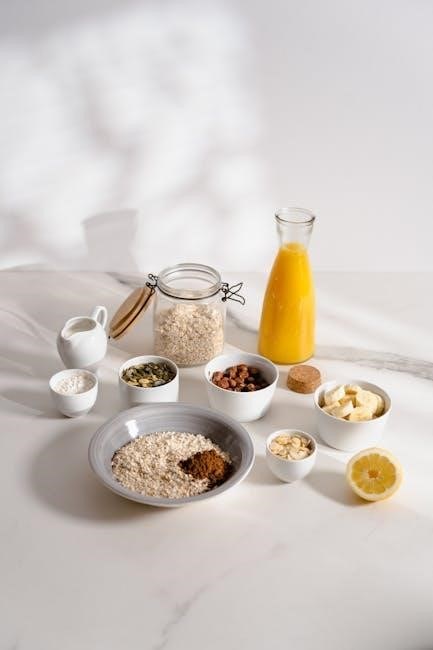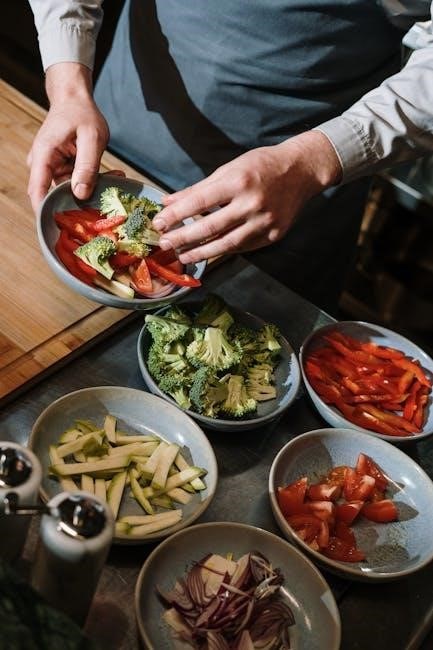Meal prep is a time-saving strategy involving preparing meals in advance to promote healthy eating and organization. It offers structured plans, recipes, and tips for efficient meal management, ideal for busy lifestyles aiming to balance nutrition and convenience.
1.1 What is Meal Prep?
Meal prep, short for meal preparation, involves planning, cooking, and portioning meals in advance to streamline daily eating. It allows individuals to prepare healthy, balanced meals ahead of time, ensuring convenience and reducing food waste. This approach is ideal for busy schedules, as it provides grab-and-go options for breakfast, lunch, dinner, and snacks. Meal prep often includes organizing ingredients, cooking in batches, and storing meals in containers for later use. It promotes consistency in nutrition and can be tailored to suit dietary preferences, such as low-carb, vegan, or macro-based diets. By prepping meals, individuals can save time, improve eating habits, and maintain a structured approach to their daily meals.
1.2 Why is Meal Prep Popular?
Meal prep has gained popularity due to its practical benefits for modern lifestyles. It offers a convenient solution for busy individuals seeking to save time, eat healthily, and avoid last-minute food decisions. By prepping meals in advance, people can maintain consistency in their diet, reduce food waste, and enjoy portion-controlled meals tailored to their preferences. Additionally, meal prep helps in budgeting by planning grocery shopping and minimizing unused ingredients. Its versatility caters to various dietary needs, such as vegan, low-carb, or macro-based diets, making it a go-to strategy for those aiming to balance nutrition and convenience without compromising on taste or variety.

Benefits of Meal Prep
Meal prep offers numerous advantages, including time efficiency, cost savings, and healthier eating. It helps maintain portion control, reduces food waste, and ensures consistent nutrition throughout the week.
2.1 Time and Money Savings
Meal prep significantly saves time by reducing daily cooking efforts and minimizing last-minute takeout orders. Planning meals in advance allows for bulk grocery shopping, which often lowers costs. By preparing meals ahead, individuals avoid food waste and optimize ingredient usage. This approach ensures that meals are ready-to-go, fitting seamlessly into busy schedules. Over time, meal prep can lead to substantial financial savings and a more efficient lifestyle. It’s a practical solution for those aiming to balance health, budget, and time management effectively.
2.2 Healthy Eating and Nutritional Balance
Meal prep is a powerful tool for maintaining healthy eating habits and ensuring nutritional balance. By planning meals in advance, individuals can control portion sizes and ingredient quality, making it easier to adhere to dietary goals. Preparing meals ahead of time reduces the likelihood of resorting to fast food or unhealthy snacks. This method also allows for the creation of balanced meals that include essential nutrients, vitamins, and minerals. Many meal prep recipes are designed to cater to specific dietary needs, such as low-carb, high-protein, or plant-based diets, making it easier to maintain a healthy lifestyle. This approach promotes overall well-being and long-term health benefits.
2.3 Portion Control and Reduced Waste
Meal prep excels at promoting portion control and minimizing food waste. By measuring ingredients and preparing specific quantities, individuals can avoid overeating and ensure each meal is balanced. Planning meals in advance allows for the strategic use of leftovers, reducing the likelihood of unused ingredients. Many meal prep strategies encourage creating a “meal bank” of pre-cooked proteins, grains, and vegetables, which can be combined creatively throughout the week. This approach not only saves money but also helps reduce kitchen waste. Proper storage techniques and portioning ensure that meals remain fresh and nutritious, making meal prep a sustainable and efficient way to manage food resources.

How to Get Started with Meal Prep
Start by planning meals, shopping for ingredients, and prepping portions. Organize recipes, portion control, and storage to create a structured and efficient meal prep routine.
3.1 Planning Your Meals
Effective meal planning begins with setting clear dietary goals and preferences. Choose recipes that align with your lifestyle, ensuring variety and balance; Create a weekly calendar, listing breakfast, lunch, dinner, and snacks. Consider batch cooking and ingredient reuse to simplify prep. Make a detailed grocery list to avoid waste and ensure all needed items are purchased. Adjust portions based on serving sizes and nutritional needs. Finally, schedule prep days to assemble meals efficiently, keeping them fresh and ready for the week ahead. This structured approach ensures meals are organized, nutritious, and tailored to your needs.
3.2 Essential Tools and Ingredients
Stocking your kitchen with the right tools and ingredients is crucial for successful meal prep. Invest in durable, airtight containers for storage, along with reusable bags and labels for organization. A good chef’s knife, cutting board, and measuring cups are indispensable. For ingredients, focus on versatile staples like lean proteins, whole grains, and fresh or frozen vegetables. Healthy fats such as olive oil and avocado, along with spices, add flavor without extra calories. Having a well-stocked pantry ensures variety and convenience. Additionally, consider a food scale for portion control and a slow cooker for hands-off meal preparation. These tools and ingredients form the foundation of a efficient and enjoyable meal prep routine.
Best Practices for Effective Meal Prep
Plan meals in advance, shop smart, and prep in batches. Use airtight containers, label everything, and store properly for freshness. Maintain variety to avoid boredom.
- Stick to a schedule for consistency.
- Portion meals to prevent waste.
- Incorporate leftovers creatively.
4.1 Grocery Shopping Strategies
A well-organized grocery list is essential for effective meal prep. Plan meals in advance and list all required ingredients to avoid impulse buys. Stick to your list to stay on track and budget. Shop for seasonal produce to ensure freshness and cost-effectiveness. Consider buying in bulk for non-perishable items like grains, proteins, and spices. Consider pre-chopped vegetables or rotisserie chickens for time-saving options. Organize your list by store sections (e.g., produce, meats, dairy) to streamline shopping. Finally, review sales flyers to stock up on discounted staples, ensuring you have everything needed for your meal prep plan.
4.2 Storage and Reheating Tips
Proper storage is crucial for maintaining the freshness and safety of prepped meals. Use airtight, leak-proof containers to store meals in the refrigerator or freezer. Label containers with dates and contents for easy identification. Portion meals into individual servings to reduce waste and simplify reheating. For refrigerated meals, consume within 3-5 days, while frozen meals can last up to 3 months. When reheating, use microwave-safe containers or oven-safe dishes to ensure even heating. Add a splash of water or broth to maintain moisture during reheating. Avoid overcrowding containers during storage to prevent bacterial growth. Cooling meals completely before freezing helps preserve texture and flavor. Always reheat meals to an internal temperature of 165°F (74°C) for food safety.

Common Mistakes to Avoid in Meal Prep
Common mistakes include lack of planning, improper portioning, and ignoring storage guidelines, which can lead to wasted food and unhealthy meals.
5.1 Lack of Planning
Lack of planning is a common mistake in meal prep that often leads to wasted food and unhealthy choices. Without a clear plan, meals may lack balance, and grocery shopping becomes disorganized. This can result in last-minute takeout or poor nutritional decisions. Planning helps create structured meals, ensuring variety and nutrient balance. It also prevents overbuying ingredients that may go unused. A well-thought-out plan guides grocery lists and portion sizes, reducing waste and saving time. Starting meal prep without a plan can lead to frustration and inconsistency, making it harder to maintain healthy habits. Always begin with a detailed meal plan tailored to your dietary goals and preferences.
5.2 Improper Storage Techniques
Improper storage is a critical mistake in meal prep that can lead to food spoilage and safety issues. Using the wrong containers or failing to seal them properly allows air and moisture to enter, causing meals to degrade faster. Food should be stored in airtight, shallow containers to maintain freshness and prevent bacterial growth. Labeling containers with dates ensures older meals are consumed first, reducing waste. Additionally, improper temperature control, such as storing meals at incorrect refrigerator or freezer settings, can compromise food quality. Always cool meals to room temperature before refrigerating to prevent condensation and spoilage. Proper storage techniques are essential for maintaining meal quality and safety throughout the week.

Advanced Meal Prep Techniques
Advanced meal prep involves refining skills like bulk cooking, ingredient optimization, and creative presentation. These techniques enhance efficiency and meal appeal, ensuring variety and sustainability in your prep routine.
6.1 Macro-Based Meal Prep
Macro-based meal prep focuses on balancing macronutrients—proteins, carbohydrates, and fats—to meet specific dietary goals. By calculating and portioning each macro, individuals can tailor meals for weight management, muscle gain, or enhanced performance. This method often involves precise measurements and ingredient selection, ensuring every meal aligns with nutritional targets. Many resources, like guides and PDFs, offer structured plans and recipes to simplify the process, making it easier to maintain consistency and achieve desired outcomes effectively.
Meal prep is a game-changer for busy lifestyles, promoting healthy eating and time efficiency. It offers flexibility and structure, helping individuals easily achieve their health goals.
7.1 Final Thoughts on Meal Prep
Meal prep is a versatile and practical approach to maintaining a balanced lifestyle. It saves time, reduces food waste, and ensures healthy, nutritious meals are always available. Whether you’re a busy professional, a parent, or someone focusing on fitness, meal prep offers flexibility and structure. With countless recipes and strategies, it’s easy to customize plans to suit individual preferences and dietary needs. Guides and tools, like downloadable meal planners, make the process even more accessible. By incorporating meal prep into your routine, you can achieve your health goals while enjoying delicious, home-cooked meals without the daily hassle of cooking from scratch.
